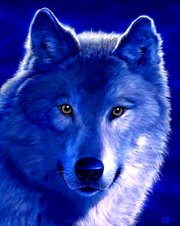
Arctic Warming Threatens More Mammals
WASHINGTON (April 25) - The polar bear has become an icon of global warming vulnerability, but a new study found an Arctic mammal that may be even more at risk to climate change: the narwhal.
The narwhal, a whale with a long spiral tusk that may have inspired the myth of the unicorn, edged out the polar bear for the ranking of most potentially vulnerable in a climate change risk analysis of Arctic marine mammals.
The study was published this week in the peer-reviewed journal Ecological Applications. Polar bears are considered marine mammals because they are dependent on the water and are included as a species in the U.S. Marine Mammal Protection Act.
Scientists from three countries quantified the vulnerabilities that 11 year-round Arctic sea mammals have as the world warms. After the narwhal -- which is also known as the "corpse whale" -- and polar bear, the most at risk were the hooded seal, bowhead whale and walrus. The ringed seal and bearded seal were least at risk.
"What we wanted to do was look at the whole picture because there's been a lot of attention on polar bears," said study co-author Ian Stirling, a polar bear and seal specialist for the Canadian government. "We're talking about a whole ecosystem. We're talking about several different species that use ice extensively and are very vulnerable.
"The study looked at nine different variables that help determine ability to withstand future climate changes. Those factors included population size, habitat uniqueness, diet diversity and ability to cope with sea ice changes.
This doesn't mean the narwhal -- with a current population of 50,000 to 80,000 -- will die off first; polar bear counts are closer to 20,000 and they are directly harmed by melting ice, scientists said.
But it does mean the potential for harm is slightly greater for the less-studied narwhal, said study lead author Kristin Laidre, a research scientist at the University of Washington.
Stanford University biologist Terry Root, who wasn't part of the study, said the analysis reinforces her concern that the narwhal "is going to be one of the first to go extinct" from global warming despite their population size.
"There could a bazillion of them, but if the habitat or the things that they need are not going to be around, they're not going to make it," Root said.
Polar bears can adapt a bit to the changing Arctic climate, narwhals can't, she said.
While polar bears are "good-looking fluffy white creatures," Laidre said narwhals, which are medium-sized whales, are "not that cute."
The narwhal, which dives about 6,000 feet to feed on Greenland halibut, is the ultimate specialist, evolved specifically to live in small cracks in parts of the Arctic where it's 99 percent heavy ice, Laidre said. As the ice melts, not only is the narwhal habitat changed, predators such as killer whales will likely intrude more often.
"Since it's so restricted to the migration routes it takes, it's restricted to what it eats, it makes it more vulnerable to the loss of those things," Laidre said in a telephone interview from Greenland, where she is studying narwhals by airplane.
The paper is the talk of Arctic scientists said Bob Corell, the head of an international team of scientists who wrote a massive assessment of risk in the Arctic in 2004 but wasn't part of this study. He called it "surprising because the polar bear gets a lot of attention."
Inuit natives of Greenland were telling scientists last year that it seemed that the narwhal population was in trouble, Corell said.
It is hard to believe alot of the stuff YOU hear today about "global warming" and all the things that come with it. So much of this stuff has been dispelled as of late, YOU don't know what or what not to believe. From my perspective, based on things I have read and knowledge learned in various places at various times, the planet is going through a cyclical change that does and will effect weather patterns and conditions. If YOU want to call it global warming, have at it. Some, however, prefer to call it global cooling. It has been nearly 12,000 years or so since the last "ice age". We are due!
If this is all a natural planetary cycle and event, there is nothing mankind can do to offset what will naturally take place. Including the extinction of some species if, that is what is specified.
The best way to deal with any of this, is to know what is going on in the grand scheme of the universe and our planet. Opyn your Mindz and get the whole picture as it is meant to be. Not just some "money grab propaganda play".
"Truth and lies are perceptual,
Reality just is........................."








